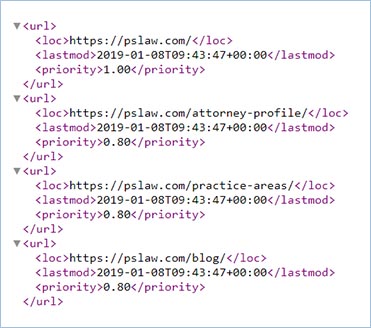
INDOBYTES
We give unique Brand identity and stunning Design. We craft websites, mobile apps, and develop digital marketing strategies.
Having a beautiful website is not enough. You have to optimize your Legal Website so that it shows up on top of the search engine results page. This is Search Engine Optimization, a method to improve your online visibility.
In this Lesson we help you build On-Page SEO strategy and successfully implement some of its key elements that enhance your legal website’s rank in search engine results.
It is a practice of optimizing content and code of every web page of your Legal Website for better ranking and to fetch more traffic through search engines.

Keep your webpage URLs short and relevant. It is wise to use the target keyword.
Bad URLs:
http://www.xyz.com/21-hello=1 (Don’t use special characters)
www.xyz.com/we-fight-for-the-victims-of-workers-comp-in-chicago (Don’t make it too long)
Perfect URL:
www.xyz.com/workers-comp
Every Page of your Law Firm Website has a Title Tag and Meta Description. The length of Title Tag should be around 50-60 characters and the Meta Description should be around 150-160 characters.
Example:
Workers Compensation | Chicago
We are full service Workers Comp law firm in Chicago. We represent injured employees during the claims process.
In the above example, the target words are ‘Workers compensation’ i.e. your practice area and ‘Chicago’ i.e. the city in which you serve.


Sitemap is an XML file that contains your Law Firm website’s individual pages. It helps the Search Engines to identify your website easily. To check if your website has an XML sitemap or not, enter the URL : https://www.YourSiteName.com/sitemap.xml
If your website has a sitemap, a list of all your web pages are displayed. If your website doesn’t have a sitemap, 404 error shows up.
The content of your Law Firm website should be original, relevant and of high-quality. It has to clearly convey about your services and practices without any grammatical errors.
Always, search engines look for original content with the right keywords. A Keyword is the word or phrase that makes it possible for people to find your website via search engines. If your target keyword is ‘Divorce Lawyer in California’, your website shows up when someone searches for ‘Divorce Lawyer in California’ via Google or other search engine.
So, focus on the right keywords and optimize the content of your Law Firm Website.
Using images that are relevant to your webpage will make it visually appealing and also helps in improving your Law Firm website’s SEO.
Every image you upload will have a title. Treat them just like your page titles and try to add a target keyword for every image that you use in your website. You can also include Alt Text and Descriptions for your images.
Optimizing your images is just as important as optimizing the content.
Make your content more readable by breaking it down into smaller sections and paragraphs with headings, which is where H1, H2, H3, H4 etc tags are used.
H1 is used for page titles. H2 is used for subtitles. The Title Tags differentiate content on the basis of their importance. H1 tags have more weight than H2. Next comes H3, and then H4. When search engines crawl through your Legal Website, it considers H1 tags as the most important content, so make sure you put the right target keyword in H1.
Include relevant keywords throughout your content. It is very important for the search engines to understand what your content is about and show up your website when someone is looking for the similar content. If you are a Workers Compensation Law Firm in Chicago, use the most-probable -keywords in your content like:
Note: Do not repeat the keywords excessively. Try to keep your keyword density from 2-5%.
A great way to optimize your website is to place internal links i.e to place links in your content that redirects to other pages of your website and external links i.e to place relevant links that redirect to other reputable website.
Internal links not only makes it easier for navigation but also helps search engines to find all of your legal website’s pages.
External links provide more relevant information to your visitors. This not only builds trust from your visitors but also helps in your Law Firm website’s ranking.
Google says that security is their priority. To secure a website it is important that you have an SSL certificate.
Search engines consider secured and safe websites to show up on their search results. Despite having a stunning website with content and images optimized for search engines, if your law firm website doesn’t have an SSL certificate, it will effect your Search Engine ranking.

If you want to prevent a page from showing up in Google search results, add ‘noindex’ in the robots.txt file.
robots.txt file is a text file that tells search engine robots which pages on your Law Firm Website to crawl and which pages to not. When you add noindex to your website’s unwanted pages, search engines will skip those pages from crawling. The noindex tag is good for SEO as it stops your ‘bad or broken webpages’ from indexing.
Google now is using the mobile version of your Law Firm Website as the baseline for your website ranking. Lack of having a mobile-friendly site will eventually effect your website ranking. So, it’s very important to either have a responsive website or an alternative mobile-friendly site for your law firm.
According to Google, one in two visitors will abandon your web page if it takes more than 3 seconds to load. Website speed is also a key ranking factor.
To increase your page speed, optimize the below website elements:
Enter your Law Firm Website’s URL into the Google’s Page speed Insights tool. It gives a grade (out of 100) based on your website’s performance on desktop as well as mobile. It also displays the elements that are slowing your website down.
Leave a Reply